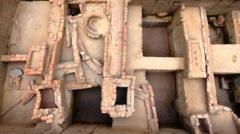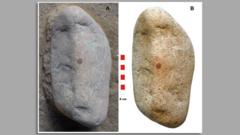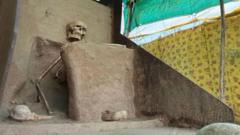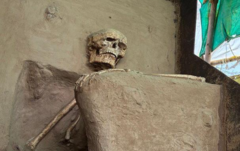Keeladi village's archaeological findings have not only unveiled a 2,500-year-old urban settlement but have also stoked political and cultural tensions between regional identities in India, challenging established historical narratives.**
Unearthing History: Keeladi Archaeological Site Sparks Cultural and Political Debate in India**

Unearthing History: Keeladi Archaeological Site Sparks Cultural and Political Debate in India**
The discoveries at Keeladi village in Tamil Nadu reveal ancient artefacts and ignite discussions on India's historical narratives and identities.**
The archaeological site in Keeladi, Tamil Nadu, has become a focal point for both historical inquiry and political debate, revealing artefacts that date back 2,500 years. The site features trenches containing terracotta pot fragments, brick structures, and burial urns, which are believed to belong to a once-thriving urban society. After years of excavations initiated by the Tamil Nadu State Department of Archaeology, over 15,000 items have been unearthed, offering significant insights into the region’s past.
Led by Ajay Kumar, the state archaeological team suggests that these findings reshape perceptions of ancient civilizations in India, emphasizing the importance of southern contributions to early urban society. The Keeladi artifacts contradict the long-held notion that significant urbanization primarily occurred in northern India. With artefacts exhibiting a level of sophistication—including varied civil functions for habitation and industry—these excavations present a compelling narrative of an interconnected ancient world.
As these discoveries garner interest, they also reflect a historical rivalry fueled by cultural pride and differing interpretations of India's past. Critics argue that the excavation's implications about the Tamil Brahmi script’s development challenge the central emphasis placed on northern civilizations. The finding of Tamil Brahmi dating back to 6th century BCE posits an independent origin of literacy in the south, contrasting with views that tie its lineage to northern scripts.
Additionally, political tensions have arisen surrounding the fate of key archaeologist Amarnath Ramakrishnan, whose transfer in 2017 and the current review status of his findings have intensified claims of federal government attempts to undermine Tamil identity. This reflects broader narratives that emphasize the cultural divergence between northern and southern India, with accusations that the central government is attempting to diminish the historical significance of Tamil heritage.
The discourse surrounding Keeladi highlights the complexities of Indian history while fostering a renewed sense of pride and identity among regional populations. As more artifacts come to light, historians, archaeologists, and politicians will continue to navigate the intricate relationship between archaeological discovery and cultural identity, marking Keeladi as a significant chapter in India's quest to understand its ancient past.




















